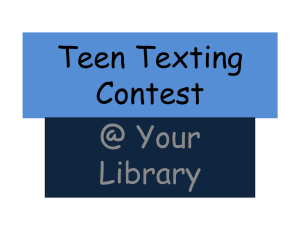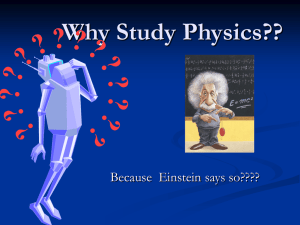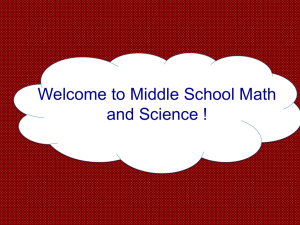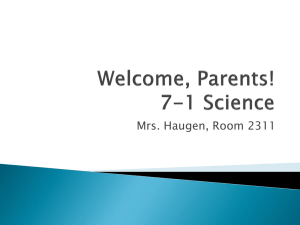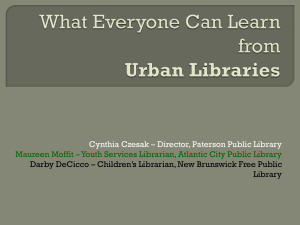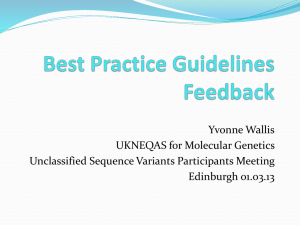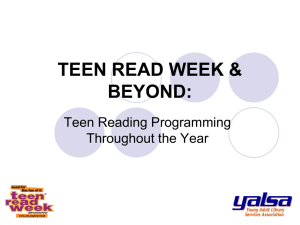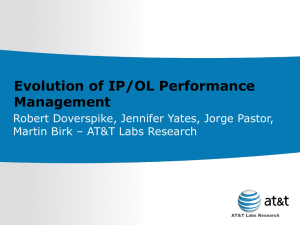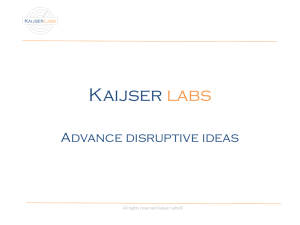ppt - Infopeople
advertisement
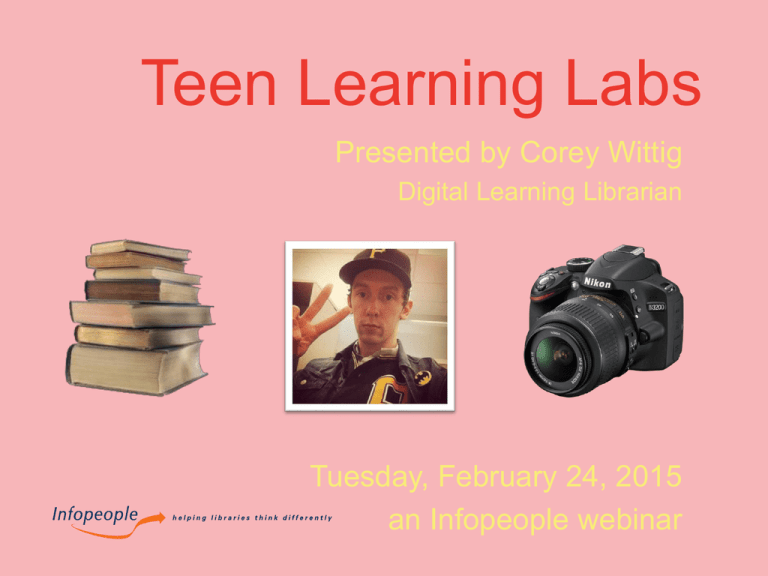
Teen Learning Labs Presented by Corey Wittig Digital Learning Librarian Tuesday, February 24, 2015 an Infopeople webinar Key Concepts of Informal Learning in Libraries • Mentor Led • Youth-centered • Traditional and Digital Media • Interest-based • Collaborative learning Youmedia.org History of Teen Learning Labs in Libraries YOUmediaChicago.org President Obama’s “Educate to Innovate” program Whitehouse.gov Research/Reports & Takeaways H angin ut Og M essi ng A rou nd G eekin ut Og “Yollocalli Open Studio Presents HOMAGO a Guidebook”, DMLcentral.net H O M A G O “Yollocalli Open Studio Presents HOMAGO a Guidebook”, DMLcentral.net Connected Learning Theory Connected Learning Research Network and Digital Media & Learning Research Hub The library is a natural site for community-based informal education “Libraries have a strong role in connected learning because they can help teens connect to people and resources that support their personal formal and informal interests.” – Jack Martin (Executive Director, Providence Public Library & YALSA past-president), Martin, Jack, Wittig, Corey, Strock Adrienne, “Library Service for Teens: Who we are we? What are we? And, where are we going?”, Young Adult Library Services, Fall Successful Learning Labs Teen Learning Labs are in libraries of all sizes! Learning Labs in Libraries and Museums: Transformative Spaces for Teens, IMLS.gov • Maker Jawn Here are some early standouts: • YOUmedia (Chicago Public LIbrary) (Free Library of Philadelphia) • The Bubbler (Madison Public Library) • Studio NPL (Nashville Public Library) • The Studio • Teen Central and IMAGINEYOU (Anythink, Rangeview Library District) (Rochester Public Library) • Information Commons (Brooklyn Public Library) Translating Research into User-Centered Programming Connect the research to • your community • Strategic Plan • Program Design • Your vision of the future of your library designthinkingforlibraries.com Outcomes of Successful Learning Labs Outcomes should be collective and personal Learning Labs in Libraries and Museums: Transformative Spaces for Teens, imls.gov There is no “one-size fits all” teen learning lab Learning Labs don’t have to be large MakerSpaces or fablabs to create the desired learning outcomes IMLS Report Common Equipment in Learning Labs “Before you go on a shopping spree and max out your credit card assess what your Makerspace will actually require.” Makerspace Playbook, School Edition Popular Software The popularity of Learning Labs There is need. • A way to track the learning that happens in our libraries • A way of engaging teens • A way to spread “transliteracy” • A necessary public service for disempowered, underprivileged teenagers Choosing the right tools and programs for your space Louisville Public Library Makerspace Survey, 2014 • Craft a survey for your teen space and your teen staff in order to find what teens want and need • Engage local schools to find where teenagers need the most support academically Staffing a Learning Lab Mentors are: • role-models • subject-matter experts • instructors, • Youth advocates Connected Learning Report, dmlhub.net Strategies for alternate staffing models • Training existing staff through one-on-one and group professional development • Put out a call for volunteer makers • Community experts, etc. • Advocate to trustees and other stakeholders for the importance of staff for learning labs • Ask them to “Support library staffing plans that acknowledge the role that all staff have in providing service for and with teens.” Guidelines for Professional Development • Share the research behind learning labs with staff in a way that is impactful to them – show learning outcomes and • Show staff that the expectation is for them to try new things – to become curious “co-learners” and not to experts • Still, training is important. Even if you don’t have as much time as you’d like, look for opportunities for PD • Roving one-on-one tech trainings with staff • Training that happens during established meetings (like a monthly teen staff meeting) • Promote CE credit Using Qualitative Evaluations Evaluation is ongoing • Action research through programming • Post-program surveys for teens • Interviews with youth as they progress through programming • Was there a change in disposition? (how the user thinks or feels) • Connect to outcomes (skills and knowledge gained through programming) Using Data to create action plans Involve staff and stakeholders in developing informal education practices so your work doesn’t happen in a bubble. Show your colleagues the need by sharing this data • Use YALSA talking points • Share stories from programming • Promote youth work to the community to draw attention and demonstrate the purpose of learning lab programming Questions Thank you coreymwittig@gmail.com Infopeople webinars are supported in part by the U.S. Institute of Museum and Library Services under the provisions of the Library Services and Technology Act, administered in California by the State Librarian. This material is licensed under a Creative Commons 3.0 Share & Share-Alike license. Use of this material should credit the author and funding source.
